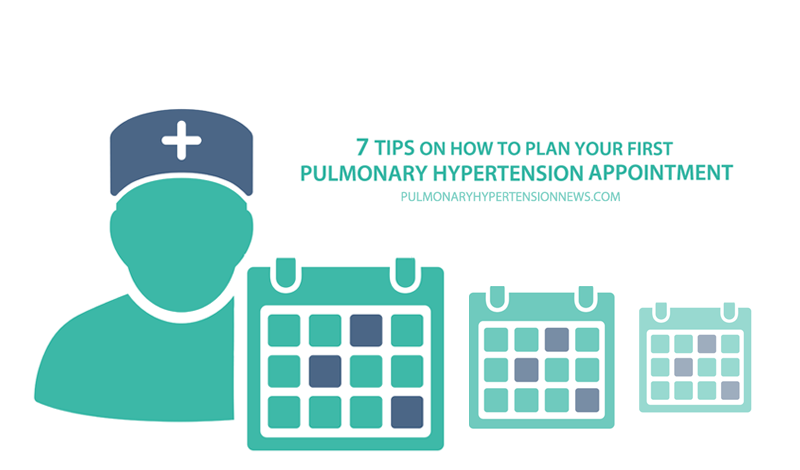7 Tips On How to Plan Your First Pulmonary Hypertension Appointment

Being diagnosed with a serious lung and heart condition such as pulmonary hypertension is stressful and overwhelming. To make things a little easier for you, we’ve decided to put together this list of seven tips that you could use to plan your first pulmonary hypertension appointment with your new doctor (source: Pulmonary Hypertension Association website):
1. Educate yourself and learn about pulmonary hypertension:
Learning about your condition will help you understand better and cope easier with PH. Having a basic understanding of common PH terms, types of treatment or just about the condition in general could be of great help.
Read more about how pulmonary hypertension develops.
2. Take care of paperwork in advance:
Don’t wait until you get to your appointment to take care of paperwork; this might stress you out even more than you already are. Call your doctor’s office in advance and ask if they can send over the new patient sheet/paperwork (they can send it by fax, email or actual mail). Don’t forget to make copies to keep for your own records before handing the original paperwork to the office.
You might be interested in learning more about 5 pulmonary hypertension online groups.
3. Educate yourself about your health insurance plan:
Make sure you have a health insurance plan and read it thoroughly so you know the types of treatments and appointments it covers. If necessary, call your doctor’s office or your insurance company to learn more about its conditions and to get answers to these specific questions:
- Do you have prescription coverage?
- What is your co-pay structure?
- Do you need referrals and prior authorization and how do you obtain them?
Want to learn more about pulmonary hypertension diet tips and recommendations?
4. Start organizing your medical information:
Get yourself a document organizer to store all your medical information in and carry it with you at all times. It’s important in case something unexpected happens. Make sure you take it to your first appointment and every appointment from then on. Here are some ideas for things to carry in it:
- A list of all your doctors and their contact information
- A list of all your medications and useful information about them (name of the medication, the dosage you need and how frequently, the reason why you taking those meds and when you first started taking them, etc).
- Always carry a copy of all your medical records
- Test and lab results
Learn more about how to create and organize your energy kit.
5. Write down your questions and bring them to the appointment
Make sure you feel comfortable speaking openly with your doctor. Bring your list of ready prepared questions and don’t forget to ask what pulmonary hypertension really is, what types of treatments are available and which one is the most suitable for you, and what types of lifestyle changes you should make, among others.
Read more about 10 Questions to Ask Your Doctor About Pulmonary Hypertension
6. Find a friend or family member to accompany you
Ask a friend or family member to accompany you to your first appointment. Your loved ones can provide support in the waiting room, confirm that you ran through all your questions, take notes on your doctor’s responses, as well as offer moral and emotional support.
You might be interested in learning more about 5 pulmonary hypertension online groups.
7. Confirm directions to the office in advance:
This may sound silly, but it’s really important. If you know exactly where your new doctor’s office is you will have one less thing to stress about when you’re heading to your appointment. Whether you’re going by car, public transport or even walking, leave home with time to spare and be sure of the route and parking options if needed.
Learn more about how to create and organize your energy kit.
How is pulmonary hypertension diagnosed? Learn more about it here.
Pulmonary Hypertension News is strictly a news and information website about the disease. It does not provide medical advice, diagnosis or treatment. This content is not intended to be a substitute for professional medical advice, diagnosis, or treatment. Always seek the advice of your physician or another qualified health provider with any questions you may have regarding a medical condition. Never disregard professional medical advice or delay in seeking it because of something you have read on this website.







